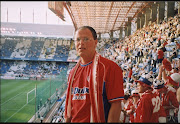 An unreliable sporting history of the Reds
An unreliable sporting history of the Reds
‘Lardy’ Lar Hennessy
Outside of a small band of statisticians – a word, incidentally, that is impossible to say elegantly while eating a boiled egg – there are very few people who have heard of Lar Hennessy. Even his mother didn’t know who he was despite the fact that he was the size of a small elephant at eight years old, or maybe, like someone going overboard in Egypt, she was merely in denial.
Lar grew up in Fenian Street – not in a house, in the street itself, as doorways were a lot narrower in those days. As such, he soon became very street-wise, being able to recognise telegraph poles and cars from an early age.
Because of his gargantuan size, he became a goalkeeper for Pearse Rangers before joining the mighty Reds in 1961 as understudy to the great John Heavey. What Lar lacked in agility, he made up for in corpulence and opposition forwards often found it difficult to find a gap to shoot at. Despite this, such was the proficiency of the aforementioned Mr. Heavey, that the Buddah-esque Lars never actually appeared between the sticks in a first team game for Shels.
Lar however can lay claim to being a true Shels legend thanks to a report in the Irish Times of January 1963 of a Cup game against Jacobs.
“There was pandemonium at Tolka Park last night as Shelbourne eased comfortably through to the next round of the Cup,” ran the report. “The real drama however came at half-time, when Shelbourne’s reserve team goalkeeper Lars Hennessy, was found to be wedged in the doorway of the away team dressing room, thus preventing Jacobs from gaining entrance.
“By the time a large pick-up truck and a tow-rope had been requisitioned, the second half had started, much to the disgust of the Jacobs’ players, who seemed to lose all interest in the game.”
A subsequent League of Ireland investigation into the matter brought further facts to light, which were gleefully relayed around the terraces at the next home game.
Being such a large person (I would say ‘fat hape’ but you’re not allowed to in these police constable times) Lars was constantly hungry and, as he passed by Jacob’s dressing room door on the way out to the tunnel, he saw the table laden with Kimberley Mikados and coconut cremes which the away team habitually feasted on at half-time due to their links with the company. Shels, as was the habit at the time, dished out a quarter of an orange to everyone.
Midway through the first half, Lars got up off the bench (causing the manager and half the backroom staff to be catapulted twenty feet into the air) and indicated he needed to going to see Mrs. Murphy, a euphemism for going to see Mrs. O’Driscoll.
Naturally, he made a bee-line for Jacob’s dressing-room and scoffed the entire lot, except for one custard cream which he left on the plate, so nobody would know he’d been in there. Unfortunately, in his haste, he tried to exit the dressing room fronton and became securely wedged.
Trooping off at half-time, the Jacobs’ players’ elation at having held Shels scoreless at half time evaporated when they realised their usual mid-match feast would not take place. For some of the team, the regular supply of fig rolls and other delicacies was the reason they had joined the club in the first place, rather than, say, Manchester United or Wolverhampton Wanderers, who both swore by citrus fruit. Finding they were to be denied their traditional perk, heads dropped, stomachs rumbled and Shels ran out clear winners.
History will show that a rampant Shels went on to beat Drums, Rovers and Cork Hibs to claim their second FAI Cup in four years. In the dressing room after the Final, Gerry Doyle, the manager, apparently, filled up the Cup not with champagne, but with chocolate kimberleys and then watched in horror as Lar swallowed them down in one.












